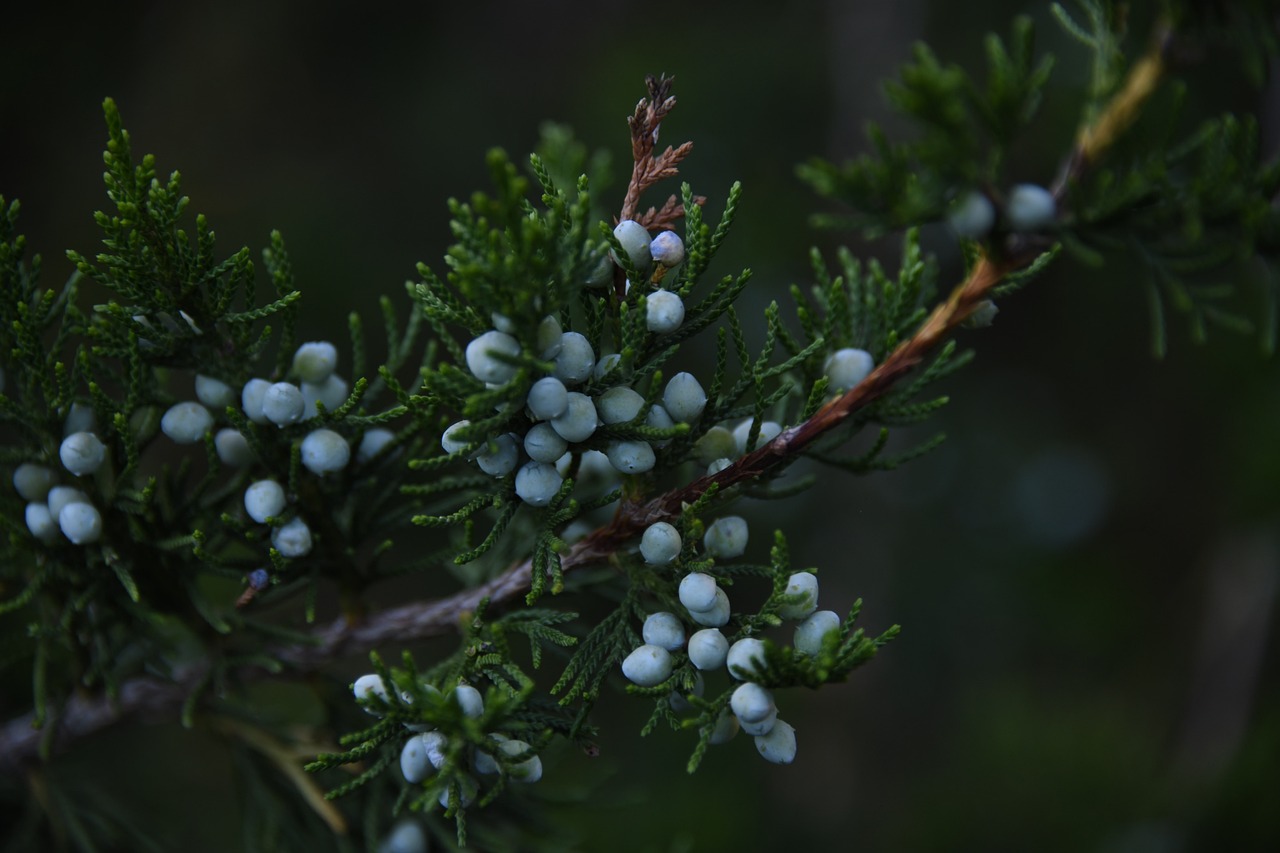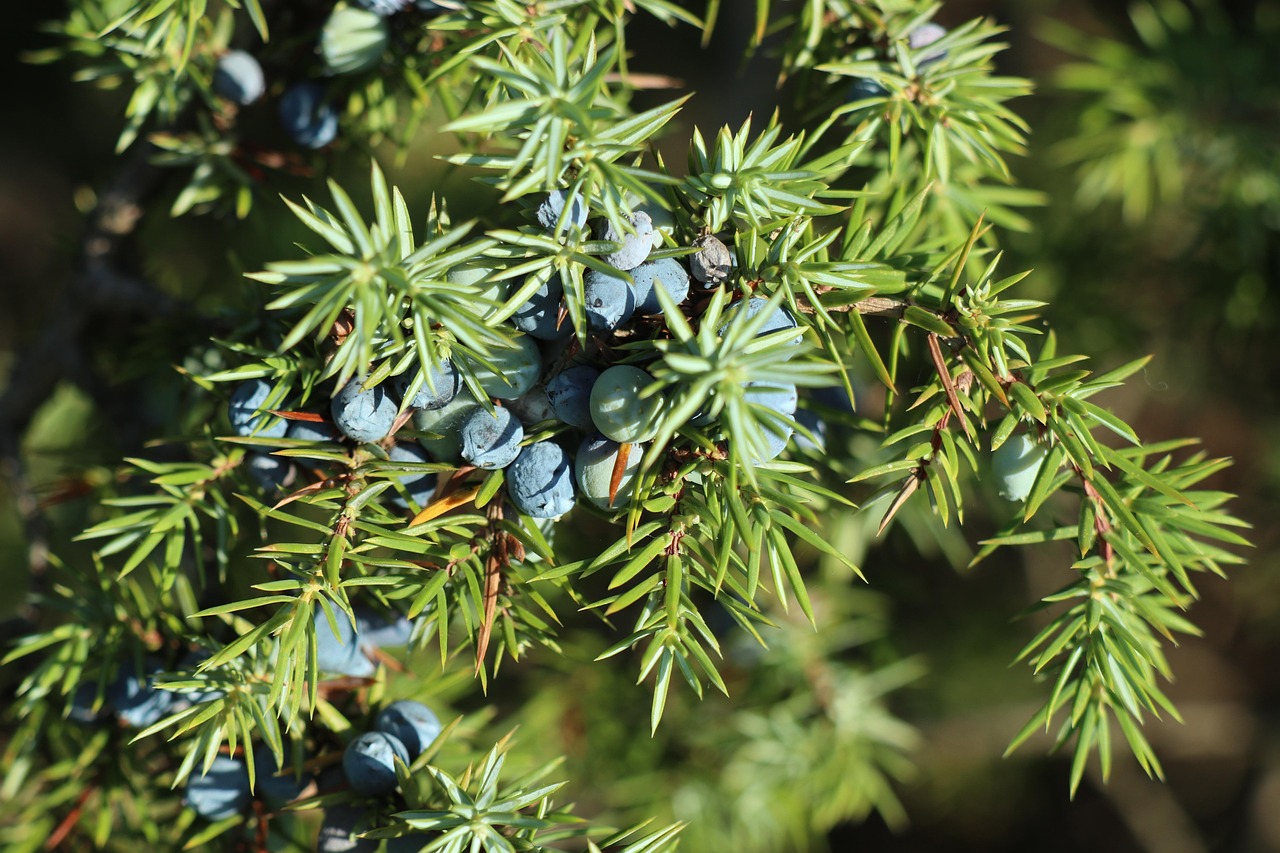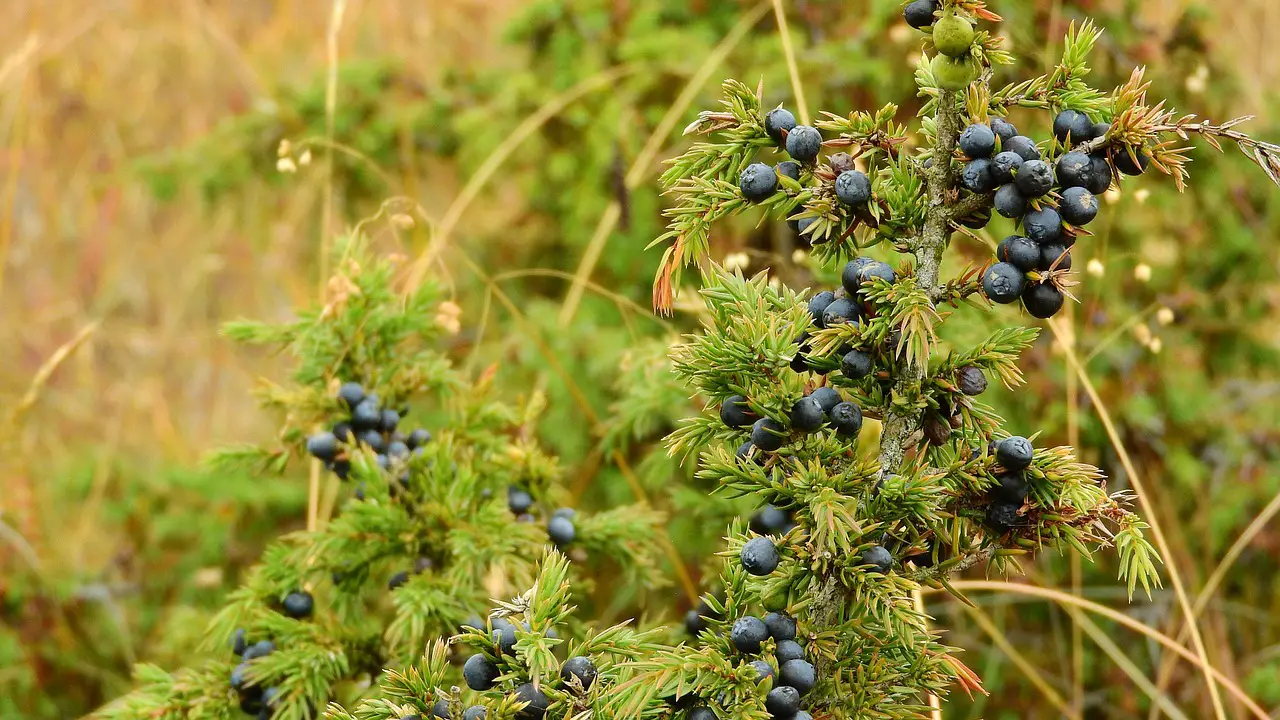Yes, juniper berries are edible and can be consumed in various forms. However, while some species are safe to eat, others can be toxic. It is essential to identify the correct type before consuming them.
Understanding Juniper Berries
Juniper berries are the female cones produced by juniper trees, which belong to the Cypress family. These berries are small, round, and typically blue or purple in color. They have a unique flavor that ranges from sweet to spicy, making them a popular ingredient in culinary dishes and beverages, particularly gin.

There are over 60 species of junipers, and not all of them produce edible berries. The most commonly used species for culinary purposes is Juniperus communis. This variety is known for its flavor profile and safety for consumption. It is crucial to note that while juniper berries are edible, they should be consumed in moderation due to their potent flavor and potential side effects.
Juniper berries have been used traditionally for centuries in various cultures. They have served not only as a food source but also as a medicinal ingredient. Their historical uses include treating digestive issues, respiratory problems, and even infections. This rich history adds to their appeal in modern culinary practices.
Health Benefits of Juniper Berries
In addition to their culinary uses, juniper berries offer several health benefits. Here are some notable advantages:

- Antioxidant Properties: Juniper berries contain antioxidants that help protect the body from oxidative stress.
- Digestive Aid: They can stimulate appetite and improve digestion when used in moderation.
- Anti-Inflammatory Effects: Juniper berries may help reduce inflammation in the body.
- Antimicrobial Activity: Their natural compounds possess antimicrobial properties that can help fight infections.
Culinary Uses of Juniper Berries
Juniper berries are versatile in the kitchen. They can be used whole or crushed to release their oils. Here are some common culinary applications:
- Flavoring for Meats: They pair well with game meats, pork, and poultry, enhancing the dish’s flavor.
- Beverages: They are a primary ingredient in gin and can also be used to infuse spirits or make herbal teas.
- Sauces and Marinades: Crushed juniper berries can add depth to sauces and marinades.
- Pâtés and Spreads: They can be incorporated into pâtés for an aromatic twist.
Risks and Precautions
While juniper berries are generally safe for most people when consumed in moderation, there are some risks associated with their use. It is essential to consider the following points:
- Toxic Species: Some juniper species are toxic. Always ensure you are using the edible varieties.
- Pregnancy: Pregnant women should avoid juniper berries as they may stimulate uterine contractions.
- Kidney Issues: People with kidney problems should consult a healthcare provider before consuming juniper berries due to their diuretic properties.
How to Identify Edible Juniper Berries
Identifying edible juniper berries is crucial for safe consumption. Here are some tips for distinguishing between edible and toxic varieties:

| Characteristic | Edible Varieties | Toxic Varieties |
|---|---|---|
| Berry Color | Blue to purple | Red or yellow |
| Berry Size | About 1/4 inch in diameter | Larger than edible varieties |
| Taste | Slightly sweet with a piney flavor | Bitter or unpleasant taste |
Understanding these characteristics will help ensure you enjoy the benefits of juniper berries without the risks associated with toxic species. Always consult reliable sources or experts when foraging for wild plants.
Harvesting and Preparing Juniper Berries
Harvesting juniper berries can be a rewarding experience. However, it is essential to know when and how to collect them properly. This section will provide guidance on the harvesting process and the preparation of juniper berries for consumption.
When to Harvest Juniper Berries
Juniper berries typically ripen in late summer to early fall. The timing for harvesting can vary depending on the species and local climate. Here are some tips for knowing when to pick:

- Color Change: Wait until the berries turn a deep blue or purple. This indicates they are ripe.
- Softness: Ripe berries should feel slightly soft when gently squeezed.
- Season: Generally, aim for late August through October for the best harvest.
How to Harvest Juniper Berries
When harvesting juniper berries, follow these steps to ensure a successful collection:
- Select the Right Plants: Choose healthy juniper bushes. Look for those with abundant ripe berries.
- Wear Gloves: It is advisable to wear gloves to protect your hands from potential irritants in the plant.
- Gently Pick: Use your fingers to gently pluck the berries from the branches. Avoid damaging the plant.
- Use a Container: Collect the berries in a clean basket or bag to prevent crushing them.
Cleansing and Drying Juniper Berries
After harvesting, it is important to clean and prepare the berries for use. Here’s how to do it:
- Rinse: Wash the berries under cool water to remove dirt and debris.
- Dry: Spread the berries on a clean towel or paper towel to air dry completely.
- Storage: Store dried berries in an airtight container in a cool, dark place. This helps maintain their flavor and potency.
Culinary Applications of Juniper Berries
Juniper berries can enhance a variety of dishes. Their unique flavor makes them a versatile ingredient in both sweet and savory recipes. Below are some popular culinary applications:
Flavoring Meats and Fish
Juniper berries work exceptionally well with various types of meat and fish. They add depth and complexity to dishes. Here are some ideas:
- Pork Tenderloin: Crush a few berries and rub them into pork before roasting for added flavor.
- Game Meats: Juniper pairs beautifully with game meats like venison, providing an earthy flavor that complements the meat.
- Fish Dishes: Use crushed juniper berries in marinades for fish, enhancing its natural flavors.
Beverage Infusions
Juniper berries are a key ingredient in gin, but they can also be used in other beverages. Consider these options:
- Infused Spirits: Add crushed juniper berries to vodka or whiskey for a unique infusion.
- Herbal Teas: Brew dried juniper berries with other herbs to create aromatic herbal teas.
- Cocktails: Incorporate juniper berries into cocktails for an innovative twist. They can be muddled or used as a garnish.
Sauces and Preserves
Juniper berries can also enhance sauces and preserves, adding complexity to flavors. Here are some ideas for incorporating them into sauces:
- Balsamic Reduction: Add crushed juniper berries to balsamic vinegar as it reduces for a flavorful sauce perfect for drizzling over meats or vegetables.
- Fruit Preserves: Mix crushed juniper berries into fruit preserves like cranberry or apple for added depth.
Packing Nutritional Benefits
The nutritional profile of juniper berries adds extra value to their culinary uses. Here are some key nutrients found in juniper berries:
| Nutrient | Amount per 100g |
|---|---|
| Calories | 50 kcal |
| Carbohydrates | 12 g |
| Fiber | 4 g |
| Vitamin C | 25 mg |
| Manganese | 1 mg |
This nutritional information highlights that juniper berries can be a low-calorie addition to various dishes while providing essential vitamins and minerals. Enjoying them as part of a balanced diet can contribute positively to health.
Potential Side Effects and Allergies
While juniper berries are generally safe for consumption, there are some potential side effects and allergic reactions to consider. It is important to be aware of these risks, especially for individuals who may have sensitivities or medical conditions.
Possible Side Effects
Some people may experience side effects when consuming juniper berries. Common side effects include:
- Digestive Issues: Consuming large quantities of juniper berries can lead to stomach upset, diarrhea, or nausea.
- Kidney Irritation: Juniper has diuretic properties that can irritate the kidneys, especially in individuals with pre-existing kidney conditions.
- Skin Reactions: Some individuals may develop skin rashes or irritation upon contact with juniper plants.
Allergic Reactions
Although rare, allergic reactions to juniper berries can occur. Symptoms of an allergic reaction may include:
- Hives: Raised, itchy welts on the skin.
- Swelling: Swelling of the lips, tongue, or throat.
- Difficulty Breathing: Shortness of breath or wheezing.
If you suspect an allergic reaction after consuming juniper berries, seek medical attention immediately. It is vital to understand your body’s reactions and proceed with caution when trying new foods.
Juniper Berries in Traditional Medicine
Juniper berries have been used in traditional medicine for centuries. Various cultures have utilized them for their potential health benefits. Here are some historical uses of juniper berries in herbal medicine:
Historical Uses
- Disease Prevention: In some cultures, juniper berries were believed to ward off diseases and infections.
- Digestive Health: They were commonly used to alleviate digestive problems, such as bloating and gas.
- Respiratory Relief: Juniper was often employed to treat respiratory conditions like coughs and bronchitis.
Modern Applications
Today, some herbalists still incorporate juniper berries into remedies. These modern applications include:
- Tinctures: Juniper berry tinctures are made by soaking the berries in alcohol or vinegar, allowing their beneficial compounds to infuse into the liquid.
- Essential Oils: Juniper essential oil is extracted from the berries and used in aromatherapy for its calming effects.
- Herbal Teas: Dried juniper berries can be brewed into herbal teas for their purported health benefits.
Sourcing and Purchasing Juniper Berries
If you prefer not to forage for juniper berries yourself, they are available through various commercial sources. Knowing where to find quality juniper berries is important. Here are some tips for sourcing them:
Where to Buy
- Health Food Stores: Many health food stores carry dried juniper berries in their spice or herb sections.
- Online Retailers: Numerous online platforms offer dried juniper berries and related products.
- Farmers’ Markets: Some local farmers may sell fresh or dried juniper berries during the harvest season.
Selecting Quality Berries
When purchasing juniper berries, consider the following factors to ensure quality:
- Aroma: Fresh juniper berries should have a strong, aromatic scent. This indicates their flavor and potency.
- Color: Look for firm berries with a deep blue or purple color. Avoid any that appear shriveled or have an off-color.
- Pest-Free Packaging: Ensure that the packaging is intact and free from signs of pests or contamination.
Culinary Pairings and Flavor Profiles
Juniper berries have a unique flavor profile that pairs well with a variety of ingredients. Understanding how to combine them can elevate your cooking. Here are some culinary pairings to consider:
Complementary Ingredients
- Meats: Juniper berries work well with rich meats such as beef, lamb, and duck.
- Herbs: Pairing with herbs like rosemary, thyme, and sage can enhance the overall flavor of your dish.
- Citrus Fruits: The sweetness of citrus fruits like oranges and lemons can balance the earthy taste of juniper.
- Berries and Fruits: Juniper pairs nicely with other fruits in desserts, especially those with a tart flavor.
This knowledge allows cooks to incorporate juniper berries effectively into their culinary creations, enhancing both flavor and presentation.
Cooking Techniques for Juniper Berries
Incorporating juniper berries into your culinary repertoire can be a delightful experience. However, understanding the best cooking techniques can enhance their flavor and effectiveness in dishes. Here are some recommended methods to prepare and use juniper berries.
Crushing and Grinding
Crushing or grinding juniper berries can help release their essential oils and flavors. Here’s how to do it:
- Mortar and Pestle: Use a mortar and pestle to gently crush the berries until they are cracked. This method allows you to control the texture.
- Spice Grinder: For a finer powder, consider using a spice grinder. Just be sure to clean the grinder afterward to avoid cross-contamination of flavors.
Infusing Juniper Flavor
Juniper can be infused into various liquids, creating a flavored base for dishes or drinks. Here are some methods:
- Infused Oils: Combine crushed juniper berries with olive oil and let it sit for a few days to create a fragrant oil suitable for drizzling over salads or grilled meats.
- Flavoring Broths: Add juniper berries to stocks and broths while simmering, allowing their flavors to meld.
- Marinades: Incorporate crushed juniper berries into marinades for meats, allowing them to soak overnight for enhanced flavor.
Cooking Times and Pairings
When using juniper berries in cooking, consider the timing of when to add them to your recipes:
- Add Early: For stews and braised dishes, add juniper berries at the start of cooking to allow their flavors to develop.
- Add Late: In lighter dishes like salads or sauces, add crushed berries towards the end of the cooking process to retain their aromatic qualities.
Common Recipes Featuring Juniper Berries
To further inspire culinary exploration, here are a few popular recipes that highlight juniper berries:
Juniper-Infused Roasted Chicken
This dish showcases the aromatic qualities of juniper berries:
- Ingredients: Whole chicken, crushed juniper berries, garlic, rosemary, lemon, salt, and pepper.
- Instructions: Rub the chicken with crushed juniper berries, minced garlic, rosemary, lemon zest, salt, and pepper. Roast until golden brown and cooked through.
Cranberry Juniper Sauce
A perfect complement to holiday meals:
- Ingredients: Fresh cranberries, sugar, water, crushed juniper berries, and orange zest.
- Instructions: Combine cranberries, sugar, and water in a saucepan. Add crushed juniper berries and orange zest. Simmer until the cranberries burst and sauce thickens.
Juniper Berry Infused Gin
Create your own flavored gin at home:
- Ingredients: High-quality vodka or gin, crushed juniper berries, and optional botanicals (like coriander or citrus peels).
- Instructions: Combine ingredients in a jar. Seal and let sit for at least three days, shaking occasionally. Strain before serving.
Final Thoughts
Juniper berries are not only edible but also offer unique flavors and potential health benefits. Their versatility in culinary applications makes them an exciting ingredient for home cooks and chefs alike. Whether used in savory dishes, beverages, or as a flavorful infusion, juniper berries can elevate your meals and provide a touch of earthiness.
While enjoying juniper berries, it’s crucial to be aware of the different species and their effects on health. Always source from reputable suppliers or harvest responsibly if foraging. By understanding the culinary uses, nutritional benefits, and precautions associated with juniper berries, you can incorporate this fascinating ingredient into your cooking with confidence.
With proper knowledge and creativity, juniper berries can become a staple in your kitchen, enhancing both flavor and nutrition in your dishes. Embrace this unique ingredient and explore new culinary horizons!
